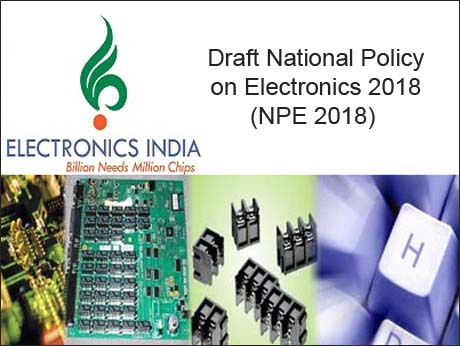
New Delhi October 12 2018: The government of India has published a draft National Policy for the Eectronics Industry 2018 (NPE) and has sought views and comments by October 23 -- a very short time indeed.
The National Policy on Electronics 2012 (NPE 2012) provided the road map for the development of Electronics System Design and Manufacturing (ESDM) sector in the country. Implementation of the Schemes/ Programmes under the aegis of NPE 2012 has successfully consolidated the foundation for a competitive Indian ESDM value chain claims the new policy. The Government now seeks to build on that foundation to propel the growth of ESDM industry in the country as one of the important pillars of both "Make in India" and "Digital India" programmes of Government of lndia.
The draft policy can be found here.
The stated objectives are:
1. To promote domestic manufacturing in the entire value-chain of ESDM for economic development to achieve a turnover of $400 Billion by 2025 including 600 Million mobile handsets valued at $ 110 Billion (approx. Rs.7 lakh crore) for export.
2. Improve ease-of-doing-business for the ESDM Industry.
3. Encourage Industry-led R&D and Innovation in all sub-sectors of Electronics.
4. Support a comprehensive Start-up ecosystem in emerging technology areas such as 5G, IoT, Artificial Intelligence, Machine Learning, etc., and their applications in areas such as Defence, Agriculture, Health, Smart Cities and Automation, with special focus on solving real-life problems.
5. Provide support for significantly enhancing availability of skilled manpower in the ESDM sector.
6. Provide support for export led growth, including significantly enhancing economies of scale in electronics manufacturing.
7. Develop core competencies in all the sub-sectors of Electronics, including Electronic components and Semiconductors, Telecommunication equipment, Medical electronics, Defence Electronics, Automotive electronics, IndustrialElectronics, Strategic Electronics, etc., and Fabless Chip Design.
8. Become a global leader in the Electronics Manufacturing Services (EMS) segment by promoting progressively higher value addition in manufacturing of electronic products.
9. Provide policy support and special package of incentives for highly capital intensive projects.
10. Drive indigenization in the microchips used by strategic and critical infrastructure sectors viz., Defence, Space, Atomic Energy, Telecom, Aviation, Power, etc., through design and production of such microchips.
11. Create specialized governance structures within the Government to cater to specific needs of the ESDM sector, in view of fast changes in technology and business models.
12. Facilitate cost effective loans for setting up and expansion of electronics manufacturing units.
13. Promote research, innovation and support to the industry in the areas of packaging, interconnects and micro photonics, as a long term measure to counter the problems posed by the continued use of Silicon, like the limit of scaling and dark Silicon.
14. Promote research, innovation and support to industry for green processes and sustainable e-Waste management, including safe disposal of e-Waste in an environment friendly manner, development of e-Waste recycling industry and adoption of best practices in e-Waste management.